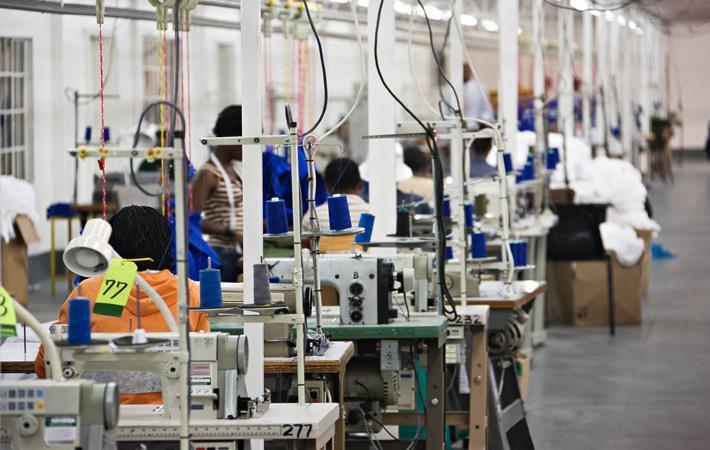Interviews
Subdued demand affects Indian textile firms: Ind-Ra
22 Jun '20
3 min read

Pic: Shutterstock
India’s subdued domestic demand and declining export demand due to global COVID-19-induced lockdowns come as a double blow for textile companies, according to India Ratings and Research (Ind-Ra), which recently said the domestic Indian demand could revive in the third quarter of this fiscal with the onset of the festive season and reopening of retail spaces.
However, export demand would fairly depend on the recoup of major economies like the United States and the United Kingdom, Ind-Ra said in its COVID-19 impact assessment for India’s textile sector.
There also seems to be a short-term opportunity for Indian companies to cater to those markets which were earlier catered by China and Bangladesh. However, the threat of import of lower cost raw materials persists and could hamper the domestic industry in the near term.
The agency expects a huge revenue downfall for textile companies in the first half of this fiscal and a moderate recovery only over the second half of the next. With the stoppage of production and shortage of labourers due to the lockdown, revenue is likely to bottom out over the first half of this fiscal, but the consumption demand is unlikely to revive in this fiscal, it said.
This is likely to result in a fall in earnings before interest, taxes, depreciation and amortization in the range of 20-50 per cent year on year(YoY) depending on the segments, leading to deterioration in credit metrics.
Furthermore, players in spinning, readymade garments carry high debts on account of stretched working capital cycles with low cushion to borrow. The agency expects the working capital cycle to stretch for textile players over the next nine months due to delays in collections and a longer inventory.
The ongoing economic slowdown is likely to contract the demand by 25-35 per cent YoY across yarn, fabric and apparels in this fiscal. The demand revival will also depend on government measure to incentivise exports.
The agency expects a correction in cotton prices over the second quarter of this fiscal from the levels of ₹95-95 per kg as of May 2020 due to a low demand and high holding levels at Cotton Corporation of India. However, holding stocks could only provide a short-term relief. Some of the inventory is expected to be exported, given the advantage of lower prices and rupee depreciation.
The textile industry is labour intensive in nature, and with most labourers headed to their hometowns, sector companies could face challenges to operate even at low capacities. The agency expects that it would take 3-4 months for operations to stabilise post Unlock 1.0.
Readymade garments and cotton yarn exports, which were already facing headwinds prior to the lockdown, are likely to be more affected than other segments, led by the fragmented nature of industry and a slowdown in Chinese yarn demand.
The situation has worsened in the lockdown with consumers delaying discretionary consumption. Man-made fibres and synthetic players have the advantage of a lower cost compared to cotton players and therefore could see a better demand, as players look to blend synthetics more in the fabrics and apparels.
Key issues like supply chain disruptions, incentives and labour unavailability need to be addressed to revive the textile sector. Labour retention policies of each state would be critical to ensure minimum disruption of manpower availability, the report added.
However, export demand would fairly depend on the recoup of major economies like the United States and the United Kingdom, Ind-Ra said in its COVID-19 impact assessment for India’s textile sector.
There also seems to be a short-term opportunity for Indian companies to cater to those markets which were earlier catered by China and Bangladesh. However, the threat of import of lower cost raw materials persists and could hamper the domestic industry in the near term.
The agency expects a huge revenue downfall for textile companies in the first half of this fiscal and a moderate recovery only over the second half of the next. With the stoppage of production and shortage of labourers due to the lockdown, revenue is likely to bottom out over the first half of this fiscal, but the consumption demand is unlikely to revive in this fiscal, it said.
This is likely to result in a fall in earnings before interest, taxes, depreciation and amortization in the range of 20-50 per cent year on year(YoY) depending on the segments, leading to deterioration in credit metrics.
Furthermore, players in spinning, readymade garments carry high debts on account of stretched working capital cycles with low cushion to borrow. The agency expects the working capital cycle to stretch for textile players over the next nine months due to delays in collections and a longer inventory.
The ongoing economic slowdown is likely to contract the demand by 25-35 per cent YoY across yarn, fabric and apparels in this fiscal. The demand revival will also depend on government measure to incentivise exports.
The agency expects a correction in cotton prices over the second quarter of this fiscal from the levels of ₹95-95 per kg as of May 2020 due to a low demand and high holding levels at Cotton Corporation of India. However, holding stocks could only provide a short-term relief. Some of the inventory is expected to be exported, given the advantage of lower prices and rupee depreciation.
The textile industry is labour intensive in nature, and with most labourers headed to their hometowns, sector companies could face challenges to operate even at low capacities. The agency expects that it would take 3-4 months for operations to stabilise post Unlock 1.0.
Readymade garments and cotton yarn exports, which were already facing headwinds prior to the lockdown, are likely to be more affected than other segments, led by the fragmented nature of industry and a slowdown in Chinese yarn demand.
The situation has worsened in the lockdown with consumers delaying discretionary consumption. Man-made fibres and synthetic players have the advantage of a lower cost compared to cotton players and therefore could see a better demand, as players look to blend synthetics more in the fabrics and apparels.
Key issues like supply chain disruptions, incentives and labour unavailability need to be addressed to revive the textile sector. Labour retention policies of each state would be critical to ensure minimum disruption of manpower availability, the report added.
Fibre2Fashion News Desk (DS)
Popular News
Leave your Comments
Editor’s Pick
































-Ltd..jpg?tr=w-120,h-60,c-at_max,cm-pad_resize,bg-ffffff)





.jpg?tr=w-120,h-60,c-at_max,cm-pad_resize,bg-ffffff)
.jpg?tr=w-120,h-60,c-at_max,cm-pad_resize,bg-ffffff)






